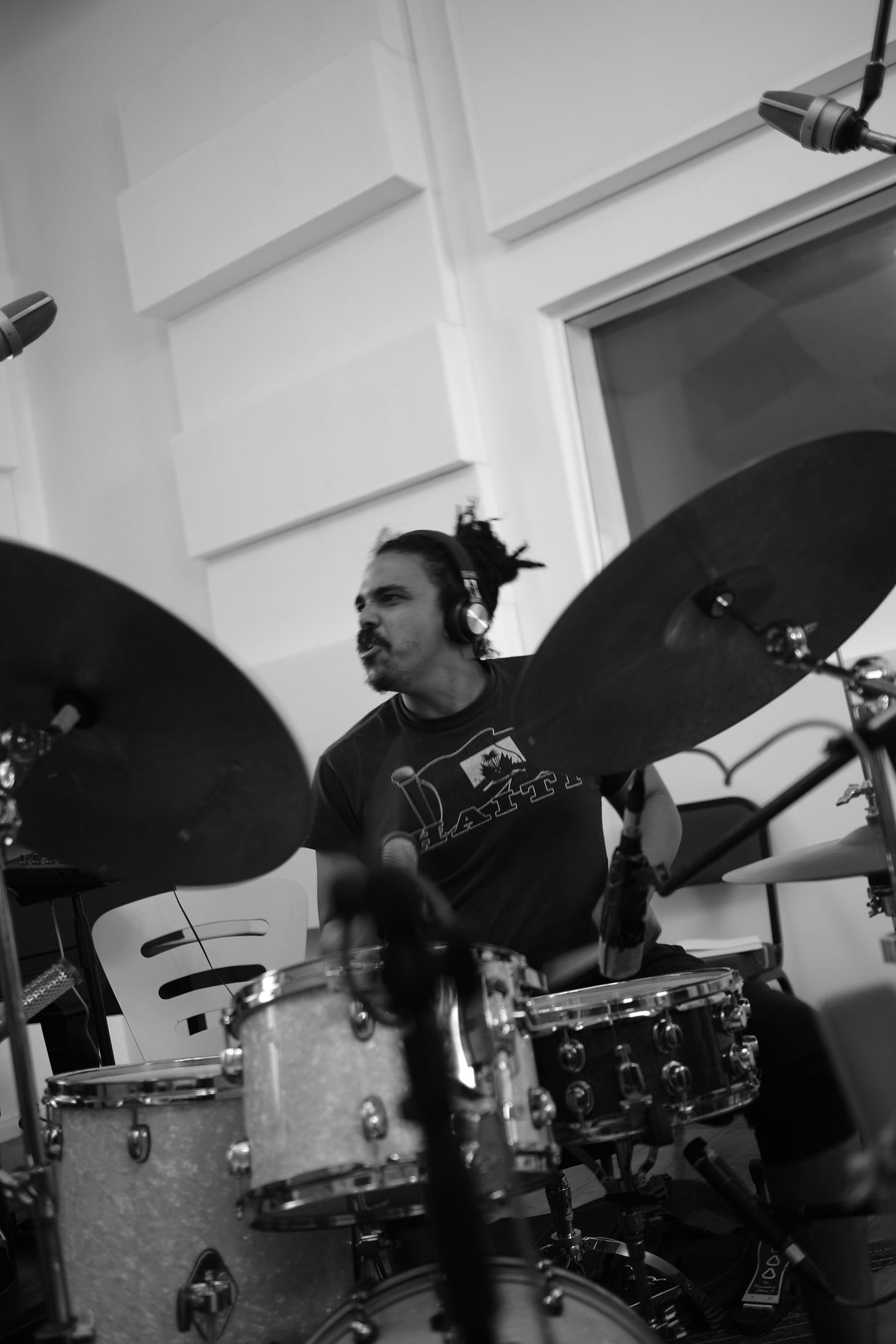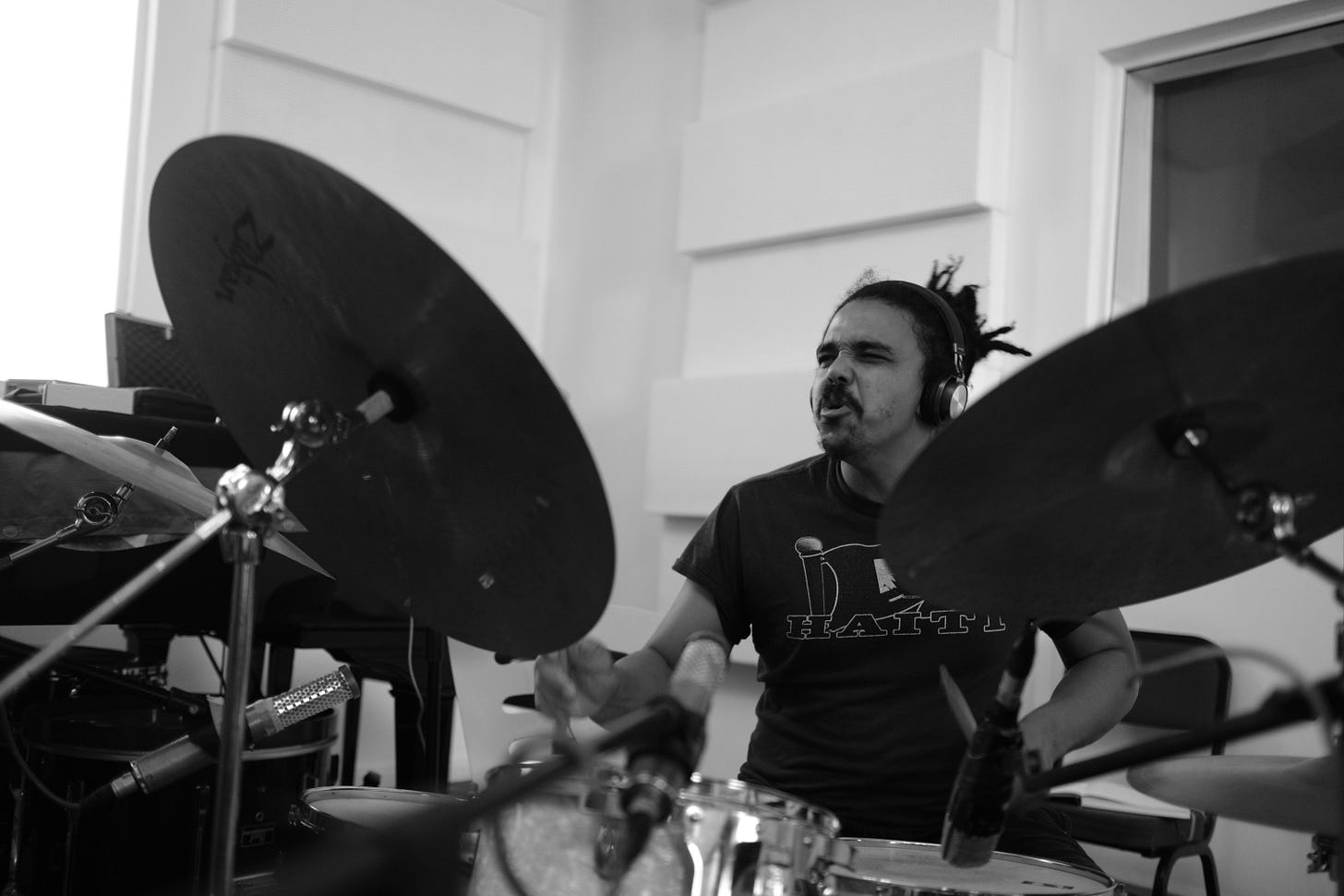I was 19 when I first started playing drums. Before then I had learned djembe from a Palestinian friend, Ala on campus at UWC in Cape Town. We used to get together and just jam out and learn together and improvise together. Mostly uneducated in the making of music, apart from Leigh, my friends and I just decided one day we wanted to start a band, and I would be the drummer. So we got the cheapest complete kit we could find, a PDP kit with some cheap meinl cymbals. I paid for it with bursary money that I had gotten for my studies.
I was introduced to jazz music, most music in my life really, by my parents. They had a compilation CD of Cape jazz music, which for the last 18 years has been a consistent favourite of mine, and through that my musical world expanded and grew. It was in those early years of my time at UWC that I began learning about the different drummers I loved. The standards, and in some cases problematic ones first, Ginger Baker and John Bonham and Joey Jordison. I was only really ever at best a moderately good rock drummer, but I had aspirations. Then, quickly, my ear turned to the jazz drummers. That’s the world I wanted to live in, and I learned about Louis Moholo and Buddy Rich and Jack DeJohnette and so many others, but for me the one that stuck out among all others, my favourite drummer of all time to this day, was Elvin Jones. I have never heard anything like it before in my life. It changed everything for me, and it was through him that I learned about the potential of drums. He created a sense of time and a language of the drums that was purely his own. And this is what I think of Asher Gamedze.
I am not putting them in the same category at all, I am not trying to do the twisting gymnastics of putting them in the same sonic field. But simply put, for me, the work of making a new language in this way, the work of making time and transforming the drum from the thing in the back that provides the pulse, to the thing that makes and animates the story that is being revealed to us, is pretty incredible work. It is a feeling, no more backbeat or pocket, but chief narrator in a multivocal ensemble.
If you have never sat behind a kit before, it could be easy to imagine that the position of the drummer is simple. Keep time. Drive rhythm. Remain in the groove. But history’s groove demands something more of us, a deeper engagement with the sonic form as it stands, because when you are black and making the sound, creating the new black sonic, your groove is already inconsistent with genre. Gamedze thrives here, distorting our expectations much in the ways Elvin Jones did for me so many years ago. What do we do when we are out of time, out of language, in excess of history, and beyond the comprehension of the aural worlds endowed by institutions of whiteness? We create new grammars and select new punctuations, not as oppositional, but simply as laying a domain for ourselves in excess of the confines already made. Intellectual classes have really removed so much meaning and feeling from jazz, abstracting and laying it bare for their own exploits, to the point where any delight and desire and joy is removed and it becomes a place where only a particular listener with a particular aesthetic in a very strictly particular room can listen to it. Gamedze is a scholar of sound and time and history, and his music is a return. What Gamedze does is return this sound to whom it belongs. A 16 year old boy learning to drive in his parents old toyota tazz in the northern suburbs of Cape Town, playing a compilation jazz CD as loud as possible on a pair of worn out pioneer 6 by 9s.
What excites me most while listening to the entirety of Gamedze’s works available to us, is the awareness that his sonic journey is only slowly being revealed to us. The foundation is out there, and the movement coming from our brother means we get to witness a new emergent black sonic, and we are invited to engage a new black aurality.
If you want a recommended listening journey or very particular album gradings and ratings, you won’t find that in this short piece. Listen to all of the tracks available to you. Go and buy all the albums you can. Then when you are done, go and listen to Coltrane’s “The Drum Thing”, where you can hear Elvin Jones on the drums in the quartet.
Enjoy it, you are allowed to enjoy it, how it feels and what it makes you think. Take a chance and find the cheapest kit you can find for now, Gamedze’s music and musings are an invitation to do just that.





